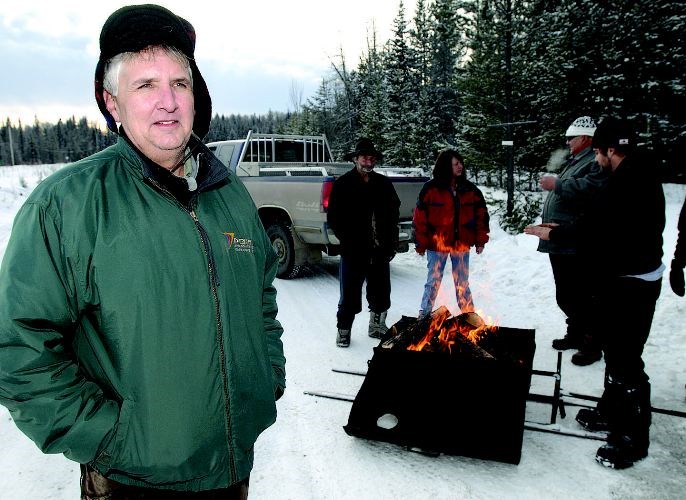Salmon Valley biosolids opponent Andy Angele is not yet sure if he will let a truckload of the material pass through when it's scheduled to make a haul next Tuesday.
"I don't know yet, I wish I did know," Angele said.
He said he remains hopeful the city will back away from shipping the material to a neighbouring farm.
The City of Prince George is seeking damages from Angele to the tune of at least $2,600 for the cost of blocking a Dec. 9 shipment when a truck was turned around at Wright Creek Road.
But city wastewater collection and facilities supervisor Gina Layte-Liston said Monday the action will not be pursued if no more blockades are held.
Angele was reluctant to talk, but in a statement issued in response to the city's notice of civil claim, filed at the Prince George courthouse this month, he said he has "no choice but to continue my opposition" to spreading the material, a fertilizer made from sludge at the Lansdowne sewage treatment plant, on a neighbouring farm.
Angele also said it was "very difficult" to put up the blockade, carried out with about a half-dozen others, but also that he had no choice.
"I believe that my security, health and future earnings on the sale of my farm will be infringed upon by the proposed application of the toxic substances to the property next to mine," Angele wrote.
The city wants to spread the material on the Arnett Ranch property, immediately adjacent to Angele's property at 23955 Pollard Road and maintains it contains only trace amounts of toxic substances and meets provincial government standards for agricultural use.
But Angele disagrees and predicts he'll suffer the consequences during spring runoff and is worried toxins will seep into the area's water supply.
"The short-term gain of the fertilizing effect from biosolids is in no way worth the long-term effect of adding toxic substances to our farm environments," Angele said in the statement.
Angele also mentioned a family on Wright Creek Road who live downslope from a Johnson Road farm where biosolids have also been used, saying they no longer drink water from their well because of the possibility of contamination.
Reached Tuesday, Carson Schweder confirmed he and his family have relied on bottled and truck-hauled water for about five years now.
He said chloroforms were found in the water when they bought the property six years ago but the problem was fixed when a proper sump pump was installed to keep out surface water.
But while the water was tested and found safe, the Schweders remained worried after learning about what had been stockpiled at the farm.
"We don't know for sure how harmful it is so we just don't take the risk," Schweder said.
Angele said he will not drink water from his well if the biosolids are brought to the Arnett farm.
Angele also said he is willing to raise the money needed to deliver the material to a forest in the Pelican Lake area which he said he city has done in the past or to log landings in need of rehabilitation.
The material is classified as class B, which means it cannot be used in populated areas but is deemed safe for rural farms and forests. However, Angele said people who live in rural areas also have a right to be protected from the potential hazards that biosolids may pose.



.png;w=120;h=80;mode=crop)